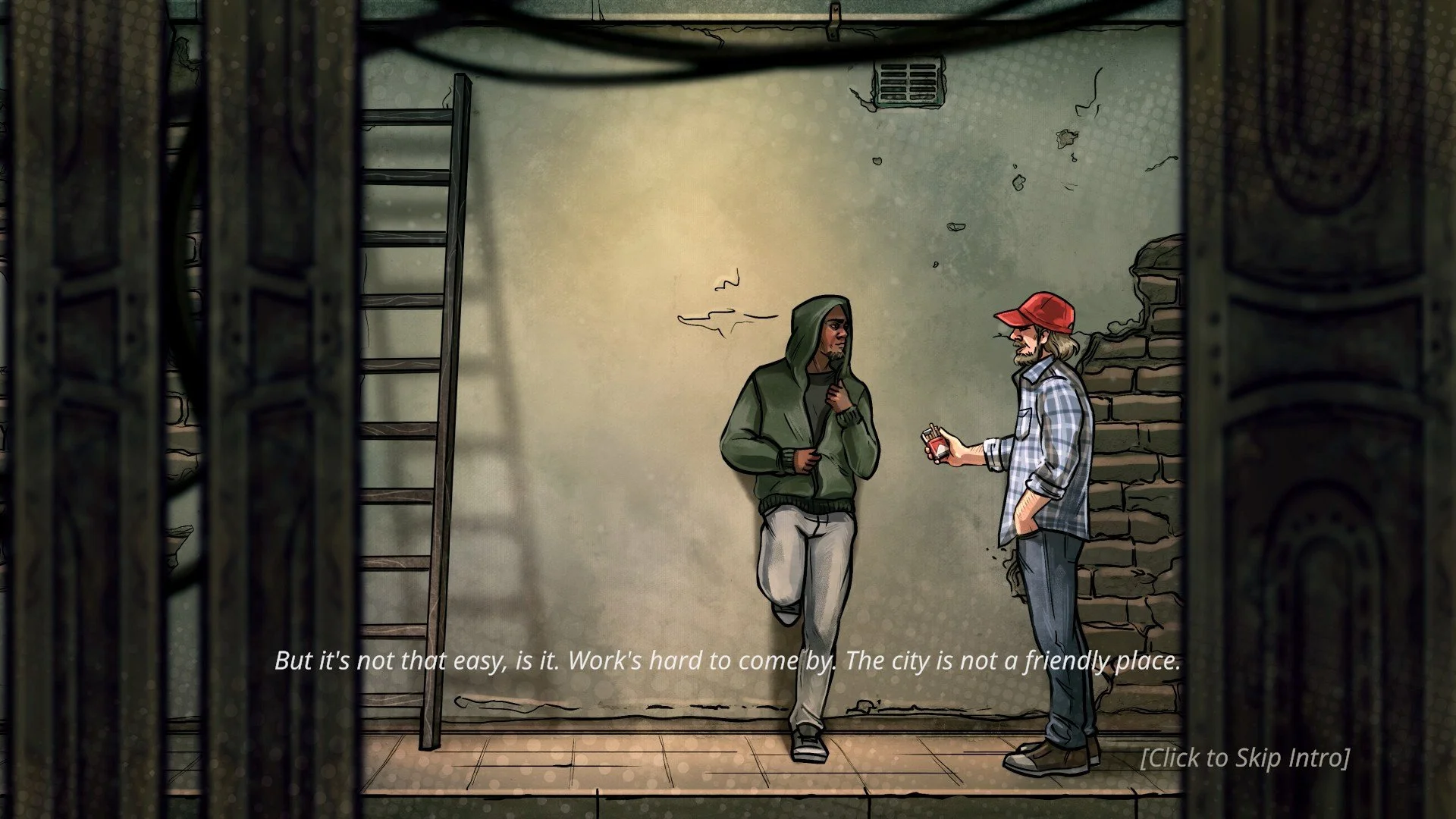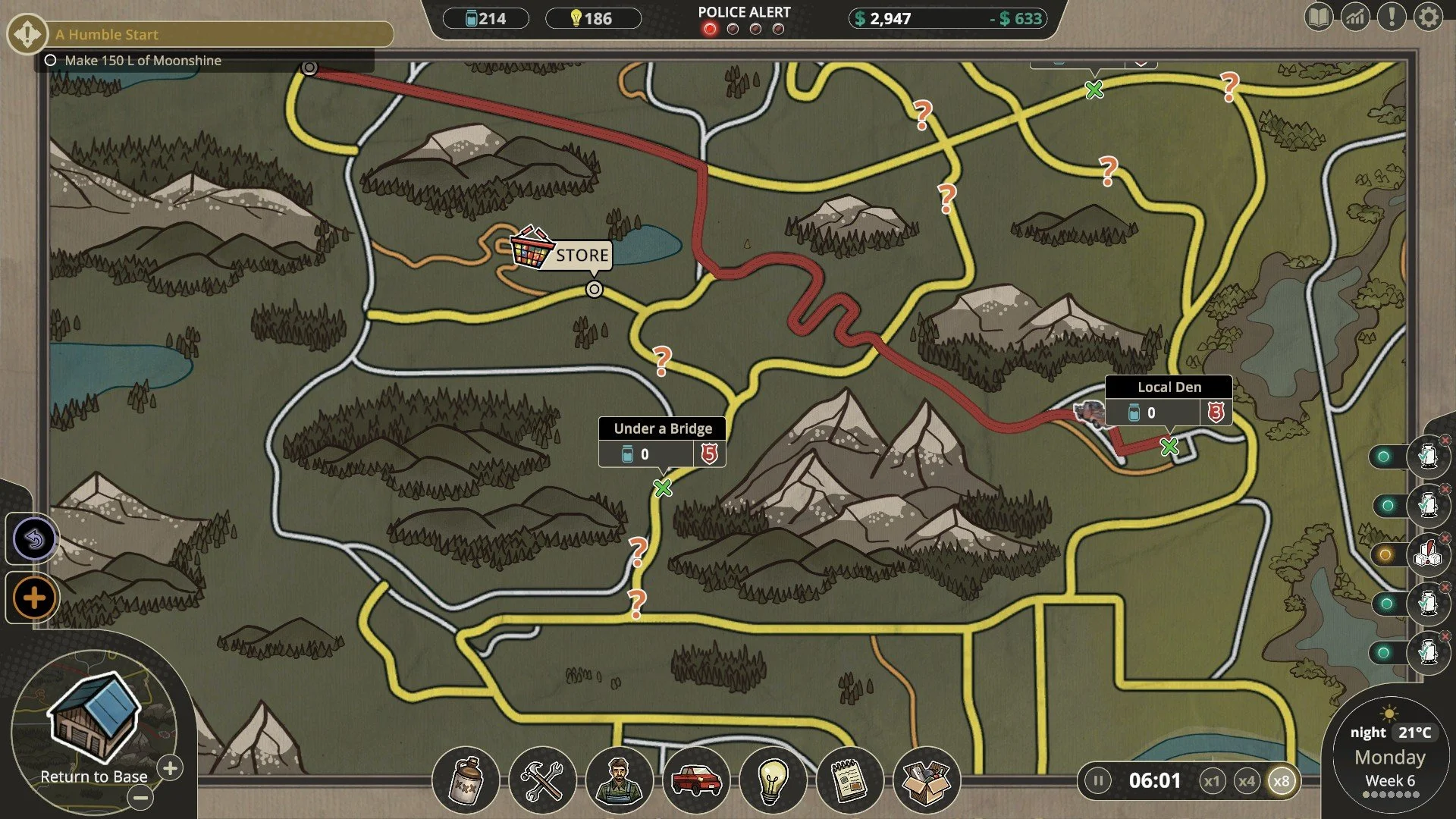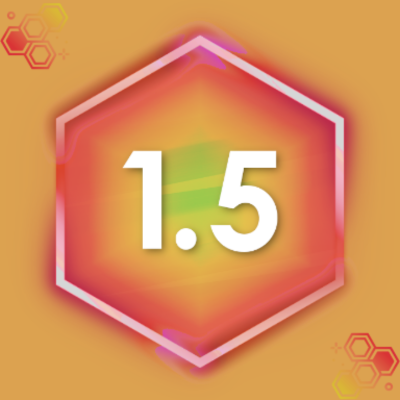Moonshine Inc Review
Moonshine, Inc.
Developer: Klabater
Publisher: Klabater
Platforms: PlayStation 5, Nintendo Switch, PlayStation 4, Xbox One, Microsoft Windows, Xbox Series X and Series S
MSRP: 19.99
It’s not often a game is a strong argument in favor of early access.
Since I first played Moonshine, Inc. in what could be considered a “rough draft” phase, it’s made leaps and bounds in getting closer to a released state. But the operative word there is closer. While playable and a lot more accessible in its current state, it is still very rough, with bugs and quality of life issues that are still somewhat frustrating. It’s a game with good ideas, but one that needed a little more time to cook than it got, resulting in some solid concepts and a sloppy enough execution that perhaps they should spend some time working out the kinks that make it less than worth the time and money.
Moonshine, Inc casts you as the unnamed grand-nephew of a moonshiner. After getting heavily in debt to the mob in “the big city,” you go back to Appalachia and take over the family still, ready to run illegal liquor to every secluded hideout in the forested mountains and learn to make a variety of recipes to get the local hillfolk utterly blasted. As you research methods, recipes, and equipment, you grow your moonshine empire and expand through multiple levels, reconnecting with your great uncle and sister as all three of you try to strike it rich.
Moonshine, Inc. is a brewing sim, similar in some ways to games like Terroir or Hundred Days with its fine-tuning and management over each step. You figure out recipes through trial and error, balance that against your missions and the demands of your eccentric clients, and use the money you get for upgraded equipment and facilities to make better liquor, all while dodging the police. It’s a premise with a lot of potential, one that has you trying to supply based on demand while your ingredients are watched by the cops, and encouraging you to experiment with various flavors and recipes to unlock further varieties on the “recipe map,” a large web of recipes where each recipe completed successfully opens up more hints, allowing you to plan out what you want to experiment with and balance based on the progress you already have.
The ideas behind the brewing process are at least intuitive. If you want to experiment with a wide variety of processes, you can. If you want to keep things as simple as possible and mess around with the flavor profile and then dump as much ethanol as possible into the end result, well, you can do that too. It’s accessible in a way you don’t usually get, with sims falling to either one side or the other— either easy enough you don’t have to think about it, or complex enough that you get lost in the weeds and never manage to create something high quality. After some upgrades and experimentation with the format, the player’s able to knock it out of the park, and fine-tune things as they go based on the problems they themselves find. It’s a great feeling once you finally unlock that understanding, and the best part of the game.
Unfortunately, the parts around it are nowhere near as balanced. The store, for example, has you buy bulk ingredients and avoid ingredients that might be watched for “police pressure,” but the police pressure bar went up regardless of whether I bought anything. Similarly, the selling mechanics are a little lacking in options— there are random events, but they occur rather infrequently and only on specific routes. You also don’t get to set a route when you make a delivery, the driver will just take a preset route to a place, no shortcuts or cop avoidance available (at least from what I saw). For a game about moonshining, the thing that birthed a major driving subculture and gave birth to things like auto racing, it felt frustratingly simple where it should be more complex.
Similarly, the plot tends to be more of an excuse than anything else, with only a vague suggestion of a story. For a game that gates its content from chapter to chapter, the narrative should actually be more than a vague skeleton. A proper narrative in a simulation game can work wonders— just look at recent hard-SF citybuilder Ixion, for example— for a plot that has you constantly solving problems and gaining better tech as the story requires it, but in Moonshine, Inc you’re hard-pressed to discover the story or why it’s happening. At most, you get a bunch of text boxes with your great-uncle and sister talking, and then eventually you move on to the next “area” with absolutely no real variety at all. It might as well be a sandbox mode.
This weird gating even extends to the tutorial. There’s a very “stop and go” kind of feel to it, where you’re only allowed to do what it asks of you, but the game stops you from even doing that properly, with sliders always stopping just shy of the number you’re instructed to use, and it all combines to feel more like it’s holding you back as opposed to guiding you, making sure that you stay on the path and follow it exactly.
Which all begs the question: When do you get to play the game?
Sure, you can make an astonishing number of recipes, but every time you try to break out on your own or discover something for yourself, the game complains that you haven’t used one of the existing recipes. If you try to figure out your own flavor profile, the game starts pushing you towards one of the existing recipes it has. You can research and unlock a robust number of techniques and equipment to use, but do only a limited amount with them, as the game keeps you from researching tech or unlocking recipes too fast by gating more advanced techniques behind later chapters. The “chapter” structure itself doesn’t do much more than keep you locked off from further content, teasing future discoveries but only after you finish a to-do list, lose all your equipment, and set up a new still in a different location. It leads to you running out of things to do or goals to achieve save for that arbitrary to-do list very quickly, with you unlocking all the resources and recipes you need very early in a chapter and then essentially killing time by completing your story tasks.
This ties into a larger issue: The gameplay feels incredibly arbitrary. Sure, you get a great opening sequence with voice acting and a setup of the premise, but once you get into the game, it’s just watching the same three guys run around your backwoods hideaway moving crates from one place to another, and occasionally setting up a delivery to one of three locations. When you run low on ingredients, you go to the store and rack up a bill. Most of what you do is wait: Wait for the distillation to move on to the next phase so you can fine-tune your batch from one of the robust menus, wait for the police to catch wise to you (which they don’t, usually), wait for the deliveries to complete, wait until the game acknowledges you completed its objectives, or wait for something to advance. It’s just not that interesting to wait. There aren’t a lot of issues that will come up, the game is almost insultingly easy, and even watching your little criminal enterprise work isn’t worth it. Things eventually just turn into you watching progress bars and occasionally checking something else going on. I found myself running it in another window and checking back when my tasks were completed. When I did that, nothing about the experience fundamentally changed.
All of this makes the rougher elements feel a lot worse than they actually are. If all your time is spent in menus, then UI elements being broken (like on the fermentation screen, where sometimes the graphs end up halfway up your screen) or completely vanishing (like on the distillation and bottling screens) make no sense. If the story objectives feel arbitrary, then it makes it look all the worse when the story is barely unconnected text box conversations. If your content is gated behind specific chapters, then the chapters meaning nothing is frustrating, something made even more so by the lack of any indication of progress in the story tasks. No progress bars, not even a simple counter to show how close you are to the goal. If you’re spending most of your time micromanaging distillation and occasionally placing equipment, then getting soft-locked in menus makes you want to engage with the main part of the game that much less enjoyable. If you have to spend time micromanaging at all, then the game not pausing when you’re on the map or looking through menus just seems frustrating. When it feels like there’s very little point to playing the game, then you begin to wonder why the developers even bothered.
Which brings us back to the top of the review.
If Moonshine, Inc was in early access, all of this could be forgiven. It would acknowledge the game wasn’t finished, but that there was a dedication to polishing it up. It would show more of an effort being made. At the time of this review, the game’s been patched to 1.02 and still feels like it’s a playable beta.
It’s a game centered around one excellent idea. It would be lovely if there were more than that one.
The Good:
- Robust distilling modes and a variety of interesting recipes to unlock and tinker with
- Nice soundtrack
- Decent art
The Bad:
- Uninteresting gameplay loop
- Severe balance issues (Wildly easy in some places, mildly obtuse in others, arbitrary gating across the game)
- Unfinished-feeling gameplay and visuals
Final Score:
Maybe I’ll play the finished version and revise my score someday. But until then, if this is all I get, then this is all they get.






